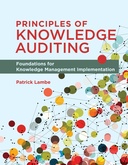Explore

A comprehensive theoretical and practical guide to the operating principles of knowledge auditing, illustrated with numerous case studies.A knowledge audit provides an “at a glance” view of an organization's needs and opportunities. Its purpose is to improve an organization's effectiveness through a better understanding of the dynamics and levers of knowledge production, access, and use. However, this developing field is hampered by the lack of a common language about the origins and nature of knowledge auditing. In Principles of Knowledge Auditing, Patrick Lambe integrates the theory and practices of the field, laying out principles and guidelines for a clearer and more pragmatic approach to knowledge auditing that makes it more accessible to practitioners and researchers.Lambe examines knowledge auditing in the context of the development of communications, information, and knowledge management in the twentieth century. He critiques and clarifies ambiguities in how knowledge audits are approached and described, as well as how the results are conveyed within organizations. He discusses the benefits and risks of knowledge management standards. Knowledge auditors, he says, need a common frame of reference more than they need standards. Standards have their uses, but they provide only markers and signposts and are poor representations of the richness of the landscape. He concludes with a set of guiding principles for practitioners.
This book is included in DOAB.
Why read this book? Have your say.
You must be logged in to comment.
Rights Information
Are you the author or publisher of this work? If so, you can claim it as yours by registering as an Unglue.it rights holder.Downloads
This work has been downloaded 85 times via unglue.it ebook links.
- 85 - pdf (CC BY-NC-ND) at Unglue.it.
Keywords
- Business & management
- communication audits
- Company secretary: role & responsibilities
- Corporate Governance
- Economics, finance, business & management
- information audits
- Intellectual capital
- knowledge assets
- knowledge audits
- Knowledge management
- knowledge management assessments
- knowledge management standards
- knowledge mapping
- knowledge value
- Management & management techniques
- Management of specific areas
- thema EDItEUR::K Economics, Finance, Business and Management::KJ Business and Management::KJM Management and management techniques::KJMK Knowledge management
- thema EDItEUR::K Economics, Finance, Business and Management::KJ Business and Management::KJR Corporate governance: role and responsibilities of boards and directors
Links
DOI: 10.7551/mitpress/14908.001.0001Editions

